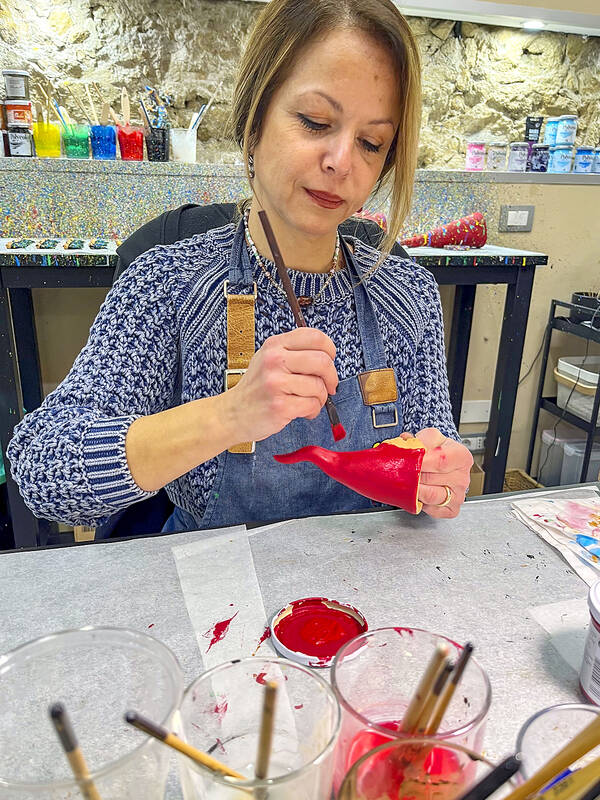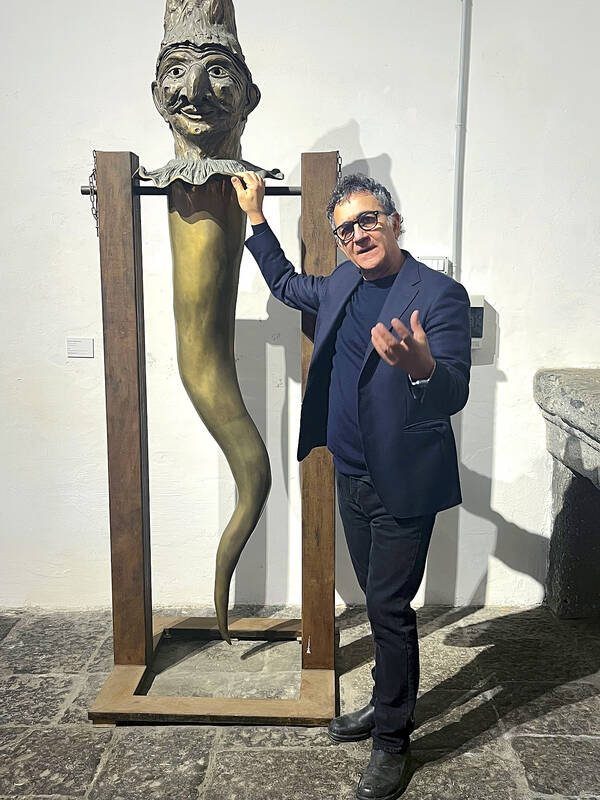Food, music and culture have made the Italian southern city of Naples famous around the globe — but there is another Neapolitan tradition that fascinates locals and visitors alike: the cornicello, an iconic symbol of prosperity, love and fortune that has become a popular present among lovers on Valentine’s Day.
The Neapolitan cornicello, a small horn-shaped amulet, represents good luck and protection against the evil eye, and is associated with fertility and strength, while its red, intense color is considered a powerful antidote against negative energies.
As with any self-respecting superstition, the power of the Neapolitan horn, to be effective, must meticulously follow some rules. The most important one is that it must be a gift, and that is why, over the years, it has become a popular present that lovers exchange on Valentine’s Day, often decorated with little hearts.

Photo: AP
Its ancient origins date back to Greek and Roman mythology, as it reproduces the phallic shape and red color in a reference to Priapus, the god of male fertility.
Neapolitan artisans meticulously handcraft cornicelli in red coral, terracotta and even gold or silver. However, a key element of the tradition is that a cornicello must be porous, enabling it to absorb all the negative energies, protecting friends and loved ones.
“The authentic cornicello has to be handmade in Naples,” said Delia D’Alessandro, 30, founder of Cosmos, a tiny workshop producing the lucky charms in the heart of San Gregorio Armeno — Naples’ narrow lane known for its pastori, or Nativity-scene figurines.

Photo: AP
D’Alessandro and her sister Serena carry on the craft learned from their parents — Vicenzo and Rosaria — and now run the family business in the city’s historical center.
“It’s a beautiful way to continue the family tradition and contribute to the city we love,” Serena said, as she paints terracotta horns crafted by a team of young artisans.
Deeply entrenched in Naples’ cultural roots, the red horn becomes a powerful symbol in the creations of Neapolitan sculptor and painter Lello Esposito.
Esposito, 67, started his long international career from the popular streets of Naples as a young artist, selling his handmade puppets of Pulcinella, the famous character of Neapolitan commedia dell’arte.
“This is the original horn that has inspired the ones in the bottegas around the city,” he said, gesturing toward a giant red-horn sculpture that dominates his atelier at Scuderie Sansevero, a majestic palace in Naples’ historic center.
“It’s red because that’s the color of passion,” said Esposito, who has focused his research on the relation between contemporary art and popular tradition.
“If we think about Pompeii, we think of Pompeiian phalluses. These penises were displayed in the little shops around the city. So, the horn is an ancient symbol going back over 2,000 years,” he added.
Esposito’s creations have traveled the world, with one of his giant horns exhibited recently at the Bangkok Art Biennale.

‘HYANGDO’: A South Korean lawmaker said there was no credible evidence to support rumors that Kim Jong-un has a son with a disability or who is studying abroad South Korea’s spy agency yesterday said that North Korean leader Kim Jong-un’s daughter, Kim Ju-ae, who last week accompanied him on a high-profile visit to Beijing, is understood to be his recognized successor. The teenager drew global attention when she made her first official overseas trip with her father, as he met with Chinese President Xi Jinping (習近平) and Russian President Vladimir Putin. Analysts have long seen her as Kim’s likely successor, although some have suggested she has an older brother who is being secretly groomed as the next leader. The South Korean National Intelligence Service (NIS) “assesses that she [Kim Ju-ae]

In the week before his fatal shooting, right-wing US political activist Charlie Kirk cheered the boom of conservative young men in South Korea and warned about a “globalist menace” in Tokyo on his first speaking tour of Asia. Kirk, 31, who helped amplify US President Donald Trump’s agenda to young voters with often inflammatory rhetoric focused on issues such as gender and immigration, was shot in the neck on Wednesday at a speaking event at a Utah university. In Seoul on Friday last week, he spoke about how he “brought Trump to victory,” while addressing Build Up Korea 2025, a conservative conference

DEADLOCK: Putin has vowed to continue fighting unless Ukraine cedes more land, while talks have been paused with no immediate results expected, the Kremlin said Russia on Friday said that peace talks with Kyiv were on “pause” as Ukrainian President Volodymyr Zelenskiy warned that Russian President Vladimir Putin still wanted to capture the whole of Ukraine. Meanwhile, US President Donald Trump said that he was running out of patience with Putin, and the NATO alliance said it would bolster its eastern front after Russian drones were shot down in Polish airspace this week. The latest blow to faltering diplomacy came as Russia’s army staged major military drills with its key ally Belarus. Despite Trump forcing the warring sides to hold direct talks and hosting Putin in Alaska, there

North Korea has executed people for watching or distributing foreign television shows, including popular South Korean dramas, as part of an intensifying crackdown on personal freedoms, a UN human rights report said on Friday. Surveillance has grown more pervasive since 2014 with the help of new technologies, while punishments have become harsher — including the introduction of the death penalty for offences such as sharing foreign TV dramas, the report said. The curbs make North Korea the most restrictive country in the world, said the 14-page UN report, which was based on interviews with more than 300 witnesses and victims who had